Assignment on Effectiveness of School-based Interventions to Prevent
This research paper aims to critically analyse the effectiveness of school-based interventions in preventing obesity among children.
55 Pages12765 Words17 Views
Added on 2022-08-26
Assignment on Effectiveness of School-based Interventions to Prevent
This research paper aims to critically analyse the effectiveness of school-based interventions in preventing obesity among children.
Added on 2022-08-26
ShareRelated Documents
Running head: EFFECTIVENESS OF SCHOOL-BASED INTERVENTIONS TO
PREVENT OVERWEIGHT AMONG CHILDREN IN THE UK
SUNIVERSITY OF SUNDERLAND IN LONDON
RESEARCH TOPIC: EFFECTIVENESS OF SCHOOL-BASED INTERVENTIONS TO
PREVENT OVERWEIGHT AMONG CHILDREN IN THE UK
STUDENT NAME: DANA DRUGHI
ID: BH48JP
PREVENT OVERWEIGHT AMONG CHILDREN IN THE UK
SUNIVERSITY OF SUNDERLAND IN LONDON
RESEARCH TOPIC: EFFECTIVENESS OF SCHOOL-BASED INTERVENTIONS TO
PREVENT OVERWEIGHT AMONG CHILDREN IN THE UK
STUDENT NAME: DANA DRUGHI
ID: BH48JP
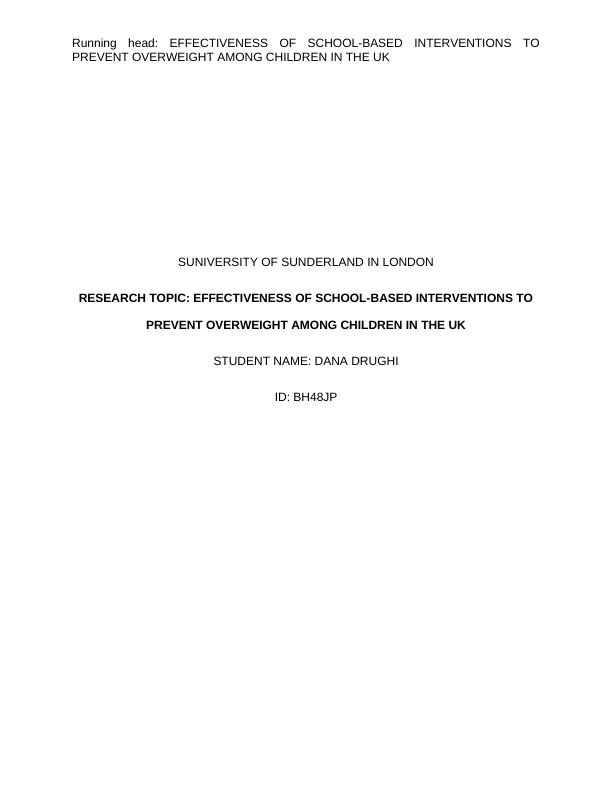
EFFECTIVENESS OF SCHOOL-BASED INTERVENTIONS TO PREVENT
OVERWEIGHT AMONG CHILDREN IN THE UK
1
Table of Contents
CHAPTER 1: INTRODUCTION TO THE RESEARCH.....................................................2
1.0 Introduction:.............................................................................................................2
1.1 Operational Definition:.............................................................................................2
1.2 Background:.............................................................................................................3
1.3. Problem Statement:................................................................................................4
1.5. Justification of Research:........................................................................................5
1.6. Significance of the Research:.................................................................................5
1.7 Summary:.................................................................................................................6
CHAPTER 2: LITERATURE REVIEW...............................................................................7
2.0 Introduction:.............................................................................................................7
2.1. Determinants of childhood obesity in the UK:.........................................................7
2.1.2 School-based Interventions:.................................................................................9
2.1.3 Effectiveness of School-based Interventions:.......................................................9
2.2 Theoretical Framework:.........................................................................................10
2.3 Conceptual Framework:.........................................................................................12
2.4 Gaps in the Literature:...........................................................................................13
2.5 Summary:...............................................................................................................14
CHAPTER 3: RESEARCH METHODOLOGY.................................................................16
3.0 INTRODUCTION TO THE CHAPTER...................................................................16
OVERWEIGHT AMONG CHILDREN IN THE UK
1
Table of Contents
CHAPTER 1: INTRODUCTION TO THE RESEARCH.....................................................2
1.0 Introduction:.............................................................................................................2
1.1 Operational Definition:.............................................................................................2
1.2 Background:.............................................................................................................3
1.3. Problem Statement:................................................................................................4
1.5. Justification of Research:........................................................................................5
1.6. Significance of the Research:.................................................................................5
1.7 Summary:.................................................................................................................6
CHAPTER 2: LITERATURE REVIEW...............................................................................7
2.0 Introduction:.............................................................................................................7
2.1. Determinants of childhood obesity in the UK:.........................................................7
2.1.2 School-based Interventions:.................................................................................9
2.1.3 Effectiveness of School-based Interventions:.......................................................9
2.2 Theoretical Framework:.........................................................................................10
2.3 Conceptual Framework:.........................................................................................12
2.4 Gaps in the Literature:...........................................................................................13
2.5 Summary:...............................................................................................................14
CHAPTER 3: RESEARCH METHODOLOGY.................................................................16
3.0 INTRODUCTION TO THE CHAPTER...................................................................16
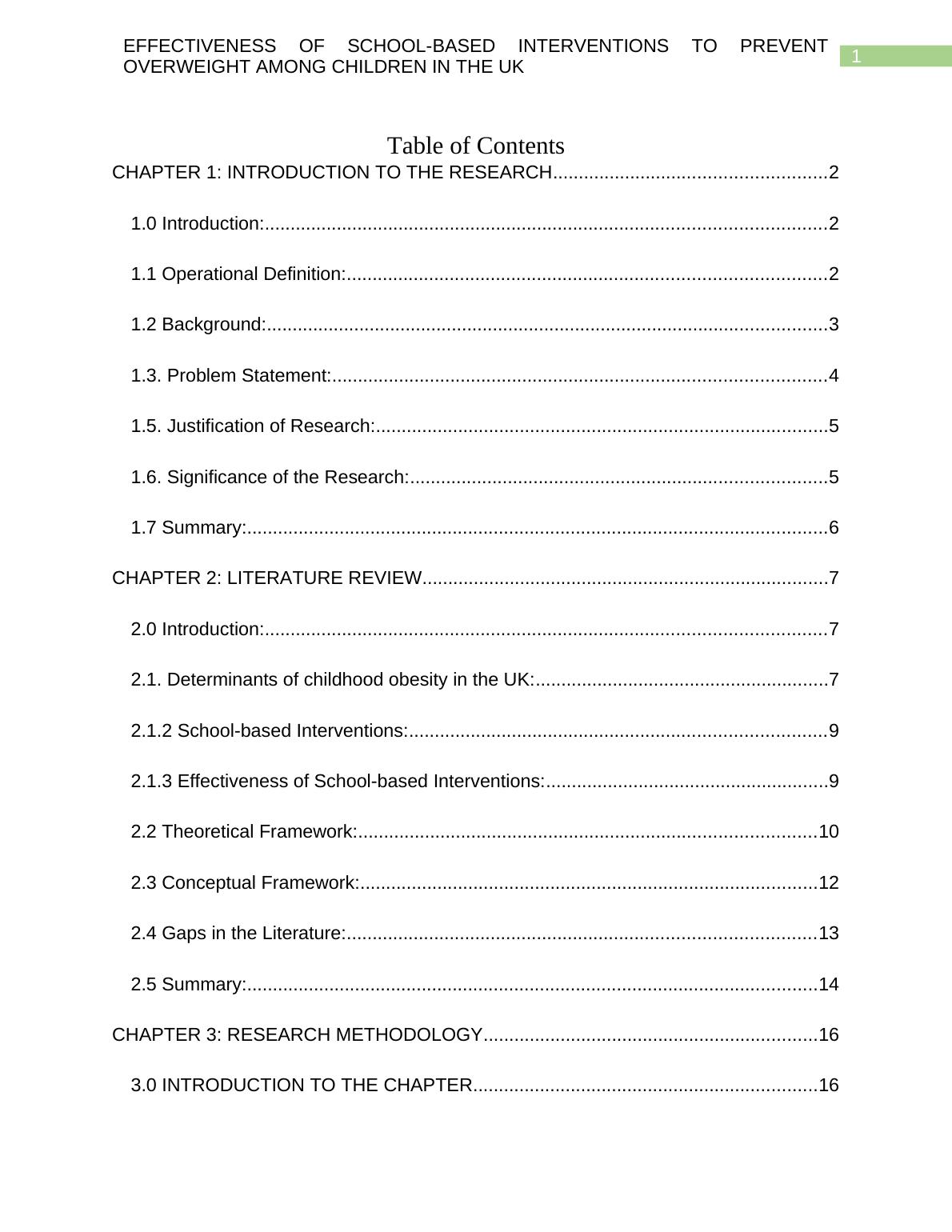
EFFECTIVENESS OF SCHOOL-BASED INTERVENTIONS TO PREVENT
OVERWEIGHT AMONG CHILDREN IN THE UK
2
3.1 PHILOSOPHICAL ASPECTS OF THE RESEARCH.............................................16
3.2 DATA COLLECTION.............................................................................................17
3.3 DATA SOURCES...................................................................................................19
3.5 INCLUSION AND EXCLUSION CRITERIA...........................................................19
3.6 DATA ANALYSIS...................................................................................................20
3.6.1 Quantitative analysis.......................................................................................20
3.7 DATA SUMMARY TABLE OF JOURNAL ARTICLES...........................................21
3.8 RESEARCH ETHICS.............................................................................................25
3.9 LIMITATIONS OF THE RESEARCH.....................................................................25
3.10 SUMMARY OF THE CHAPTER..........................................................................26
Chapter 4: Results...........................................................................................................27
4.0 Introduction:...........................................................................................................27
4.1 Summary Table:.....................................................................................................27
4.2 Discussion of results:.............................................................................................30
4.6 Summary:...............................................................................................................33
Chapter 5: Conclusions and Recommendations.............................................................35
5.0 Introduction:...........................................................................................................35
5.1 Conclusions:...........................................................................................................35
5.2 Recommendation:..................................................................................................37
5.3. Summary:..............................................................................................................42
OVERWEIGHT AMONG CHILDREN IN THE UK
2
3.1 PHILOSOPHICAL ASPECTS OF THE RESEARCH.............................................16
3.2 DATA COLLECTION.............................................................................................17
3.3 DATA SOURCES...................................................................................................19
3.5 INCLUSION AND EXCLUSION CRITERIA...........................................................19
3.6 DATA ANALYSIS...................................................................................................20
3.6.1 Quantitative analysis.......................................................................................20
3.7 DATA SUMMARY TABLE OF JOURNAL ARTICLES...........................................21
3.8 RESEARCH ETHICS.............................................................................................25
3.9 LIMITATIONS OF THE RESEARCH.....................................................................25
3.10 SUMMARY OF THE CHAPTER..........................................................................26
Chapter 4: Results...........................................................................................................27
4.0 Introduction:...........................................................................................................27
4.1 Summary Table:.....................................................................................................27
4.2 Discussion of results:.............................................................................................30
4.6 Summary:...............................................................................................................33
Chapter 5: Conclusions and Recommendations.............................................................35
5.0 Introduction:...........................................................................................................35
5.1 Conclusions:...........................................................................................................35
5.2 Recommendation:..................................................................................................37
5.3. Summary:..............................................................................................................42
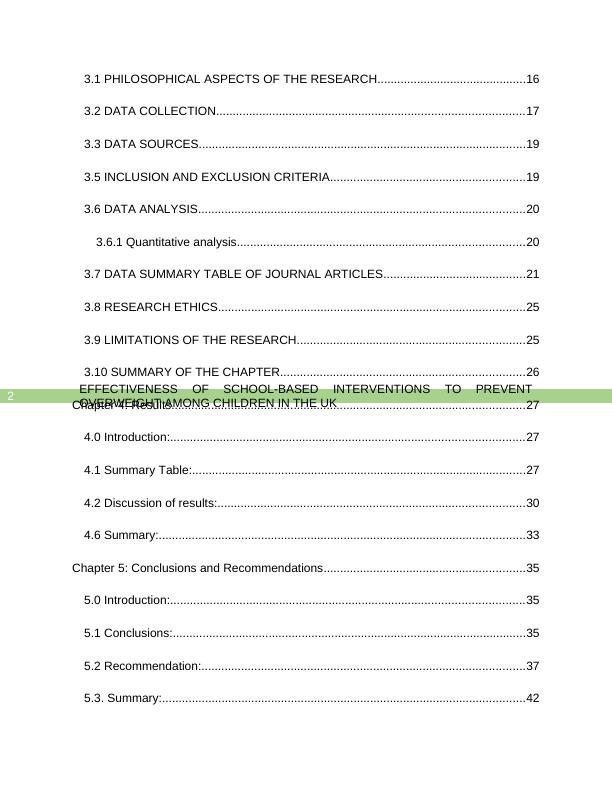

EFFECTIVENESS OF SCHOOL-BASED INTERVENTIONS TO PREVENT
OVERWEIGHT AMONG CHILDREN IN THE UK
4
CHAPTER 1: INTRODUCTION TO THE RESEARCH
1.0 Introduction:
Obesity among children is a global problem; it is actually affecting 41 million children
aged under 5 years around the world (WHO, 2016). Childhood obesity with additional
economic and health effects is a very important predictor that causes obesity in
adulthood. The UK is no difference when it comes to excess weight among children.
Reportedly a quarter of 4- or 5-years old children have obesity in the UK (NHS, 2015a).
Furthermore, this proportion of obesity among children increases during the subsequent
six years; this increase is approximately from 9% to 19% (NHS, 2015b). As a result, this
is a critical issue that requires immediate preventive actions. This research paper aims
to critically analyse the effectiveness of school-based interventions in preventing obesity
among children. In order to achieve this aim, several literatures and frameworks will be
reviewed in this paper, based on this review, a research methodology will be decided for
further advancement in this topic.
1.1 Operational Definition:
Multiple systematic reviews have suggested that school-based interventions can
actually be effective in terms of reduction of the children proportions with obesity or
excess weight. Several school-based interventions were actually very effective in Body
Mass Index or BMI reduction among overweight children (McConnell-Nzunga et al.,
2018). Study designs and interventions based on heterogeneity actually precludes
conclusions about the combination of components that are likely to be effective.
Childhood obesity is also associated with several adverse health issues such as
OVERWEIGHT AMONG CHILDREN IN THE UK
4
CHAPTER 1: INTRODUCTION TO THE RESEARCH
1.0 Introduction:
Obesity among children is a global problem; it is actually affecting 41 million children
aged under 5 years around the world (WHO, 2016). Childhood obesity with additional
economic and health effects is a very important predictor that causes obesity in
adulthood. The UK is no difference when it comes to excess weight among children.
Reportedly a quarter of 4- or 5-years old children have obesity in the UK (NHS, 2015a).
Furthermore, this proportion of obesity among children increases during the subsequent
six years; this increase is approximately from 9% to 19% (NHS, 2015b). As a result, this
is a critical issue that requires immediate preventive actions. This research paper aims
to critically analyse the effectiveness of school-based interventions in preventing obesity
among children. In order to achieve this aim, several literatures and frameworks will be
reviewed in this paper, based on this review, a research methodology will be decided for
further advancement in this topic.
1.1 Operational Definition:
Multiple systematic reviews have suggested that school-based interventions can
actually be effective in terms of reduction of the children proportions with obesity or
excess weight. Several school-based interventions were actually very effective in Body
Mass Index or BMI reduction among overweight children (McConnell-Nzunga et al.,
2018). Study designs and interventions based on heterogeneity actually precludes
conclusions about the combination of components that are likely to be effective.
Childhood obesity is also associated with several adverse health issues such as
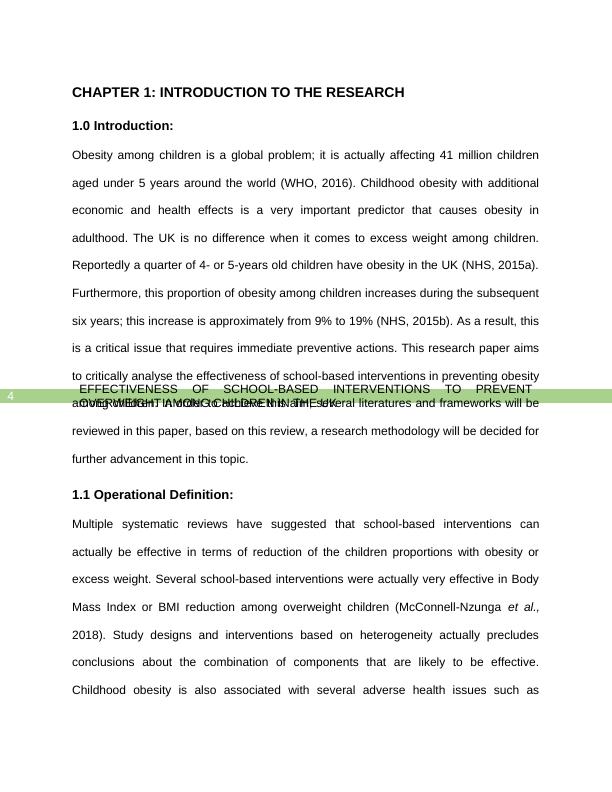
EFFECTIVENESS OF SCHOOL-BASED INTERVENTIONS TO PREVENT
OVERWEIGHT AMONG CHILDREN IN THE UK
5
diabetes, asthma, hypertension, and negative self-image during childhood, sleep
disorders, and so on (Nishtar et al., 2016). Overall, multicomponent interventions, food
and physical activities, support from teachers and extended home and community
activities are most likely to be associated with the concrete and positive results. Few
key terms used in this research are defined below:
Childhood obesity: Childhood obesity can be referred as the condition where the child
is overweight in relation to his or her age (Turner et al., 2015). This can cause some
serious impacts on the children such as diabetes, excessive cholesterol, high blood
pressure and many more.
BMI: BMI can be defined by a value which is the derivation from the height and mass of
the person (McConnell-Nzunga et al., 2018). It is basically calculated by considering the
total square of the body height and generally expressed in kg/m²
School based intervention: School based intervention is the program to reduce the
issues in the children related to the body image, eating habit and many more to provide
the healthy lifestyle (Micha et al., 2018).
1.2 Background:
Prevalence of obesity and overweight is alarmingly increasing worldwide. Based on the
collected data, obesity and overweight tendencies among the children is very common.
Around a quarter of children aged within the five years old bracket has obesity tendency
(Fitzsimons and Pongiglione, 2019). There are several causal factors that are
associated with this problem among children. The most common and also modifiable
ones are related to their regular diets, as well as physical activity behaviours. Unhealthy
OVERWEIGHT AMONG CHILDREN IN THE UK
5
diabetes, asthma, hypertension, and negative self-image during childhood, sleep
disorders, and so on (Nishtar et al., 2016). Overall, multicomponent interventions, food
and physical activities, support from teachers and extended home and community
activities are most likely to be associated with the concrete and positive results. Few
key terms used in this research are defined below:
Childhood obesity: Childhood obesity can be referred as the condition where the child
is overweight in relation to his or her age (Turner et al., 2015). This can cause some
serious impacts on the children such as diabetes, excessive cholesterol, high blood
pressure and many more.
BMI: BMI can be defined by a value which is the derivation from the height and mass of
the person (McConnell-Nzunga et al., 2018). It is basically calculated by considering the
total square of the body height and generally expressed in kg/m²
School based intervention: School based intervention is the program to reduce the
issues in the children related to the body image, eating habit and many more to provide
the healthy lifestyle (Micha et al., 2018).
1.2 Background:
Prevalence of obesity and overweight is alarmingly increasing worldwide. Based on the
collected data, obesity and overweight tendencies among the children is very common.
Around a quarter of children aged within the five years old bracket has obesity tendency
(Fitzsimons and Pongiglione, 2019). There are several causal factors that are
associated with this problem among children. The most common and also modifiable
ones are related to their regular diets, as well as physical activity behaviours. Unhealthy
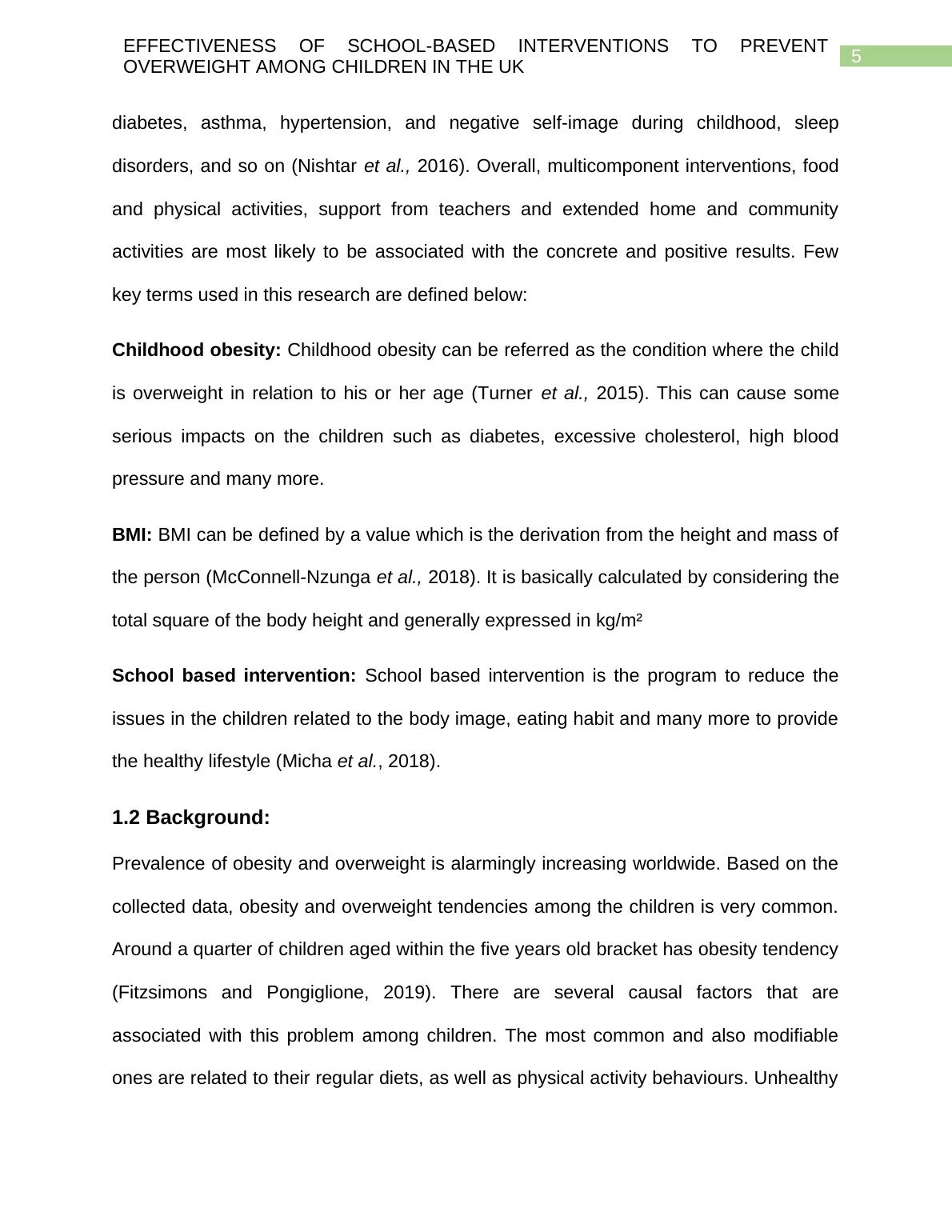
EFFECTIVENESS OF SCHOOL-BASED INTERVENTIONS TO PREVENT
OVERWEIGHT AMONG CHILDREN IN THE UK
6
diets and decreasing physical activities among the kids are actually increasing their BMI
(Nuttall, 2015). As the prior discussed statistics were constructed by several respective
authorities, this obesity tendencies and obesity-associated problems are indeed critical
for these children. (Hughes, 2018).
1.3. Problem Statement:
Childhood obesity is classified to be a major threat to public health and wellbeing. The
problem is not just in the context of the UK but also worldwide. Though, this current
research paper is focusing on the childhood obesity problem in the UK. Prevalence of
childhood obesity in the UK has significantly increased over the past few decades.
Based on the report published by the UK's National Health Service or NHS that 20.2%
of children measured during their study were obese (NHS, 2019b). Yet, the first annual
report by NHS reported only 2.4% during 2006. Furthermore, more than 26,000 children
that are around 4.4% of the studied children were severely obese. According to the
World Obesity Federation, 250 million school-aged children will be obese by 2030.
According to a report published by the UK chief medical officer Davies (2019), the
reason behind this increasing trend in childhood obesity is unhealthy diets and
increasing fast food consumption. These unhealthy diets and insufficient physical
activities are the reason behind some diseases among children such as osteoarthritis,
diabetes, heart diseases (Lopes et al., 2018). This subject matter has been chosen for
this research because of multiple reasons; every adult in the UK has a responsibility to
point out the extent of obesity in the children's prevalence in the country. Furthermore,
and several studies have already shown the severity of this problem among the children
in the UK. This is why constructing a research study based on the school-based
OVERWEIGHT AMONG CHILDREN IN THE UK
6
diets and decreasing physical activities among the kids are actually increasing their BMI
(Nuttall, 2015). As the prior discussed statistics were constructed by several respective
authorities, this obesity tendencies and obesity-associated problems are indeed critical
for these children. (Hughes, 2018).
1.3. Problem Statement:
Childhood obesity is classified to be a major threat to public health and wellbeing. The
problem is not just in the context of the UK but also worldwide. Though, this current
research paper is focusing on the childhood obesity problem in the UK. Prevalence of
childhood obesity in the UK has significantly increased over the past few decades.
Based on the report published by the UK's National Health Service or NHS that 20.2%
of children measured during their study were obese (NHS, 2019b). Yet, the first annual
report by NHS reported only 2.4% during 2006. Furthermore, more than 26,000 children
that are around 4.4% of the studied children were severely obese. According to the
World Obesity Federation, 250 million school-aged children will be obese by 2030.
According to a report published by the UK chief medical officer Davies (2019), the
reason behind this increasing trend in childhood obesity is unhealthy diets and
increasing fast food consumption. These unhealthy diets and insufficient physical
activities are the reason behind some diseases among children such as osteoarthritis,
diabetes, heart diseases (Lopes et al., 2018). This subject matter has been chosen for
this research because of multiple reasons; every adult in the UK has a responsibility to
point out the extent of obesity in the children's prevalence in the country. Furthermore,
and several studies have already shown the severity of this problem among the children
in the UK. This is why constructing a research study based on the school-based
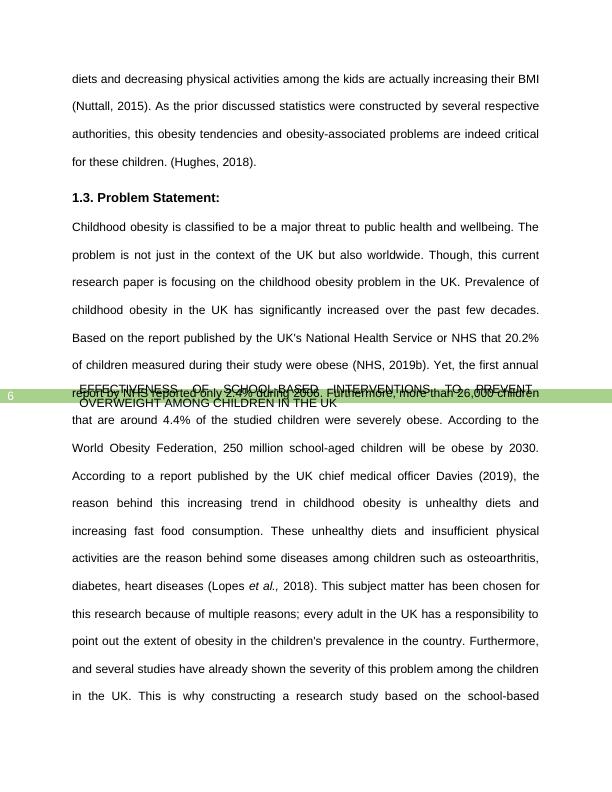
EFFECTIVENESS OF SCHOOL-BASED INTERVENTIONS TO PREVENT
OVERWEIGHT AMONG CHILDREN IN THE UK
7
intervention programs points out the necessity of viable strategy implementation and
finding a potential solution (Hung et al., 2015). This research also focuses on the
outcome assessment for their effectiveness as well. Overall, evaluation of the short-
term effects of an education-based intervention and based on the result, longitudinal
school-based educational interventions can be recommended for long-term impact on
childhood obesity prevention.
1.5. Justification of Research:
As several recent studies are reporting childhood obesity is increasing in the UK, other
obesity-associated issues or diseases are also on the rise. As a result, heart diseases
and strokes are now very common among young people because of this obese
childhood problems. Furthermore, diabetes, asthma, sleep apnea and osteoarthritis are
also reportedly the obesity-associated diseases among the children. As per NHS,
insufficient physical activity and poor diet is the reason behind this obesity issue.
1.6. Significance of the Research:
WHO has cited childhood obesity to be the most serious health challenges for public
wellbeing. Childhood obesity examination programs are necessary and also such
examinations reports about several organs in the body, this, as a result, can also
identify the risk of other diseases in the future as well (Reinehr, 2018). Effectiveness of
these programs means, attaining the significant positive behaviour change among the
children following nutritional knowledge gained from obesity education. Considering the
association of obesity and lifestyle, this study is important as it will focus on the
attribution of a decisive role to achieve voluntary changes in children's behaviour.
OVERWEIGHT AMONG CHILDREN IN THE UK
7
intervention programs points out the necessity of viable strategy implementation and
finding a potential solution (Hung et al., 2015). This research also focuses on the
outcome assessment for their effectiveness as well. Overall, evaluation of the short-
term effects of an education-based intervention and based on the result, longitudinal
school-based educational interventions can be recommended for long-term impact on
childhood obesity prevention.
1.5. Justification of Research:
As several recent studies are reporting childhood obesity is increasing in the UK, other
obesity-associated issues or diseases are also on the rise. As a result, heart diseases
and strokes are now very common among young people because of this obese
childhood problems. Furthermore, diabetes, asthma, sleep apnea and osteoarthritis are
also reportedly the obesity-associated diseases among the children. As per NHS,
insufficient physical activity and poor diet is the reason behind this obesity issue.
1.6. Significance of the Research:
WHO has cited childhood obesity to be the most serious health challenges for public
wellbeing. Childhood obesity examination programs are necessary and also such
examinations reports about several organs in the body, this, as a result, can also
identify the risk of other diseases in the future as well (Reinehr, 2018). Effectiveness of
these programs means, attaining the significant positive behaviour change among the
children following nutritional knowledge gained from obesity education. Considering the
association of obesity and lifestyle, this study is important as it will focus on the
attribution of a decisive role to achieve voluntary changes in children's behaviour.
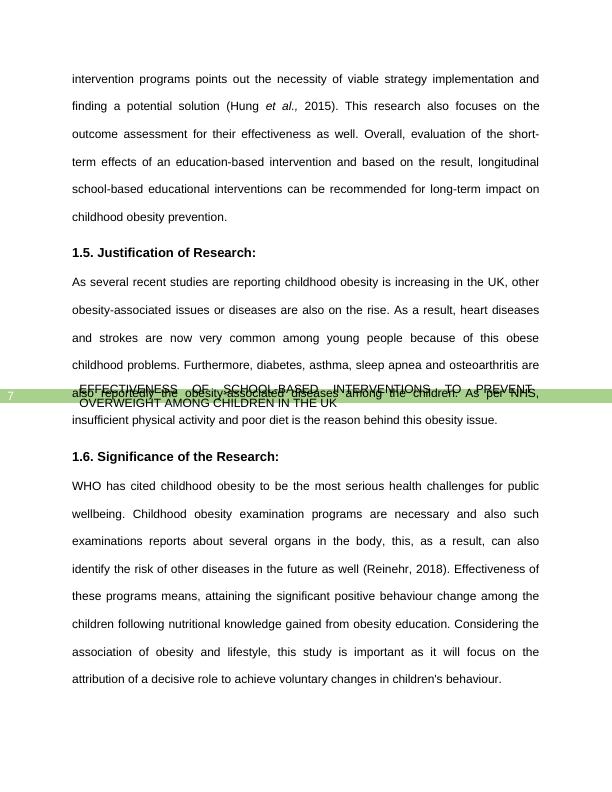
End of preview
Want to access all the pages? Upload your documents or become a member.
Related Documents
Research Topic | Prevent Overweight among Childrenlg...
|67
|13599
|15
Childhood obesity is an indicator of adulthoodlg...
|19
|5028
|31
REDUCING OBESITY IN CHILDREN THROUGH SCHOOL-BASED INTERVENTIONS1.lg...
|40
|11332
|24
A picture of overweight and obesity in Australia. A longitudinal study of home and family environment related to development of obesitylg...
|1
|834
|24
Prevention of Obesity in Children Through Physical Activity | Reportlg...
|23
|3777
|84
Effects of Obesity in Primary School Childrenlg...
|14
|3530
|159
